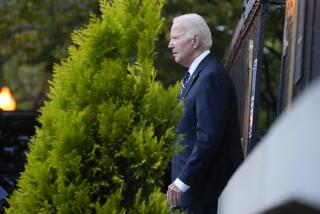Germany summons U.S. ambassador over spying reports
LONDON -- In the latest show of anger from close allies over mass electronic surveillance by the U.S., Germany summoned the American ambassador Thursday over reports that U.S. intelligence agencies might have tapped Chancellor Angela Merkel’s cellphone.
The German Foreign Ministry said it would demand an explanation from U.S. Ambassador John B. Emerson, a day after Merkel herself called President Obama and asked him to clarify matters.
It was the Obama’s second phone call this week -- the first was with the president of France -- in which he has had to soothe a European leader over revelations of spying on foreign nations on a gigantic scale by the National Security Agency.
German officials have poured scorn on the White House’s assurance that the U.S. is not currently monitoring Merkel’s cellphone and has no intention of doing so in the future, a statement that, the officials noted, did not answer whether such eavesdropping had occurred in the past. Merkel is known as an avid user of her cellphone for calls and text messages.
Her government has not elaborated on how it came to believe that the U.S. might have tapped her phone, but the news magazine Der Spiegel says it sparked the chancellor’s concern with inquiries it made to her administration about suspected eavesdropping. The magazine has published a number of stories on U.S. spying based on the documents leaked by former NSA contractor Edward Snowden.
Emerson, the U.S. ambassador, is to meet Thursday afternoon with Foreign Minister Guido Westerwelle, who the ministry said would “spell out the position of the German government.”
German Defense Minister Thomas de Maiziere said in a television interview that “the Americans are and remain our best friends” but that spying by such a close ally was “absolutely not right.”
Whether the contretemps will cause any real or lasting damage remains to be seen. Some analysts say the outraged reactions by European leaders are more about public posturing and catering to public opinion at home than a real expression of ruptured relations in a world where countries, even allied ones, routinely spy on one another.
Earlier this week, Obama spoke with French President Francois Hollande after a newspaper reported Monday that, according to documents leaked by Snowden, U.S. intelligence agencies had scooped up more than 70 million pieces of data on French phone communications within a 30-day period beginning at the end of last year.
A French government minister called such spying “totally unacceptable,” and Hollande’s government summoned the U.S. ambassador for an explanation.
ALSO:
Arab states and Western nations push Syria peace talks
Prince George: British royal family christens an heir to throne
U.S.-Pakistan relationship has nowhere to go but up, analysts say
henry.chu@latimes.com
Twitter: @HenryHChu
More to Read
Sign up for Essential California
The most important California stories and recommendations in your inbox every morning.
You may occasionally receive promotional content from the Los Angeles Times.











